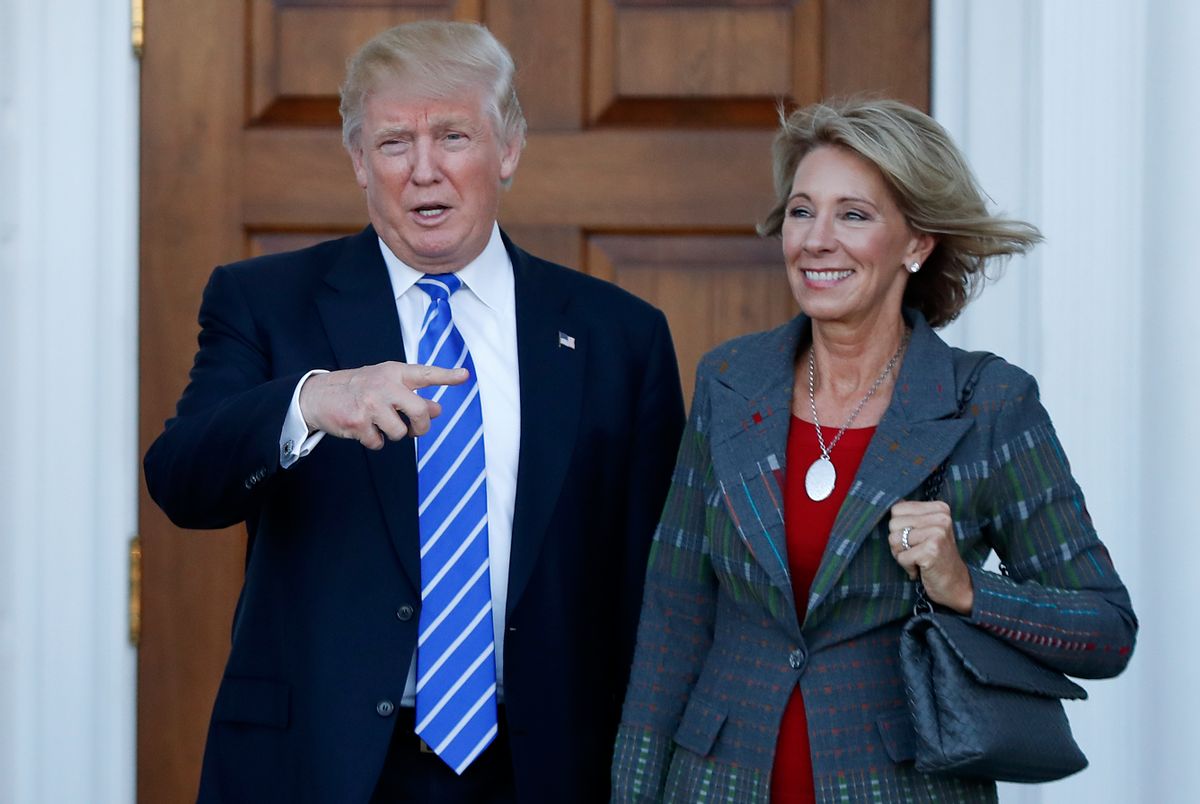Donald Trump's choice to be secretary of education, Betsy DeVos, is a woman who never went to public school, nor sent her children to public school, nor worked for public schools. She does, however, come from a wealthy family that has donated millions to the Republican Party. And she would be terrible for public education in this country.
As AlterNet explained in a 2011 profile on the DeVos family, the DeVos family is a prominent right-wing donor. Betsy Prince DeVos' father-in-law co-founded Amway, while her brother, Erik Prince, founded the notorious private military contractor Xe (formerly Blackwater USA).
While many wealthy campaign donors have pet causes, the DeVoses have been particularly driven to promote school vouchers.
In 2000, the DeVoses launched one of their most ambitious campaigns, spending millions of dollars on an unsuccessful effort to convince Michigan voters to support a voucher initiative, which would have let parents steer tax dollars to private schools instead of public ones.
The 2000 ballot initiative was voted down by 68 percent of Michiganders.
After the loss, the DeVoses shifted gears, focusing instead on pushing voucher bills through state legislatures, which they have been doing ever since. They founded a group, All Children Matter, devoted to pushing vouchers. In 2013, the group, now known as the American Federation of Children, was fined $5.2 million in Ohio for breaking campaign finance laws, which it has not yet paid. The PAC was never registered in Wisconsin, where it was hammered by the press.
American Federation for Children has worked closely with Religious Right groups that can motivate voters from their homes and churches. It also coordinates its planning through the Council for National Policy, a secretive right-wing group that meets several times a year and gives members of the Christian right access to sympathetic donors.
Betsy also serves on the board of the Acton Institute, which merges corporate interests with dominion theology, or the belief that Christians should take control of political and social institutions. Earlier this month, the Acton Institute published a blog post titled, "Bring back child labor: Work is a gift our kids can handle." (The headline on the article has removed "Bring back child labor," though that clause still lives on the URL, and was captured in tweets before it was changed.)
Trump's Education Secretary DeVos-funded Acton Institute argues for abolition of child labor laws:
Mining would be "exciting life" for kids pic.twitter.com/3T7XtEMHro
— Adam Khan (@Khanoisseur) November 24, 2016
"The DeVos family, owners of the largest charter lobbying organization, has showered Michigan Republican candidates and organizations with impressive and near-unprecedented amounts of money this campaign cycle: $1.45 million in June and July alone — over a seven-week period, an average of $25,000 a day," denounced Detroit Free Press columnist Stephen Henderson in a September op-ed discussing the DeVos' involvement in Michigan education policy. "The giving began in earnest on June 13, just five days after Republican members of the state Senate reversed themselves on the question of whether Michigan charter schools need more oversight. There’s nothing more difficult than proving quid pro quos in politics, the instances in which favor is returned for specific monetary support. But look at the amounts involved, and consider the DeVos’ near-sole interest in the issue of school choice. It’s a fool’s errand to imagine a world in which the family’s deep pockets haven’t skewed the school debate to the favor of their highly financed lobby. And in this case, it was all done to the detriment of children in the City of Detroit."
"It's like putting the fox in charge of the henhouse, and hand-feeding it schoolchildren," Michigan Board of Education President John Austin told the Detroit Free Press "Devos' agenda is to break the public education system, not educate kids, and replace it with a for-profit model."
These same thoughts were echoed by David Hecker, president of American Federation of Teachers-Michigan.
"I can't imagine a worse pick," Hecker asserted. "I think the person selected should be pro-education, but she wants to dismantle public education. She has had some success in Michigan, not because she has any expertise, but because she is rich."
Not surprisingly, DeVos depicts her motives in a much more flattering light. In a profile for Crain's Detroit Business earlier this year, when she was listed as one of the city's 100 most influential women, DeVos argued that she is driven by compassion for the less fortunate rather than any covert theocratic or elitist agenda.
"It was very much a personal and iterative process," DeVos explained. "Dick and I chose the best education for our children, realizing at the same time that there were many parents and children — there still are — who didn't have the same opportunity. And I didn't think that was fair. I still don't think it's fair."
The history of school vouchers as a policy push is a rather ugly one. Aside from often being a pretext for trying to spread the teaching of right-wing religious beliefs to American schoolchildren, school vouchers have the ignominious distinction of first becoming a prominent issue in 1954, when Southern states began advocating voucher programs after Brown v. Board of Education so they could simultaneously pull their children from and defund recently desegregated schools.



Shares